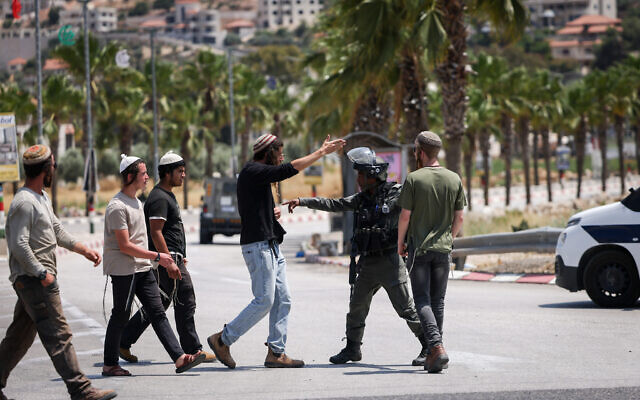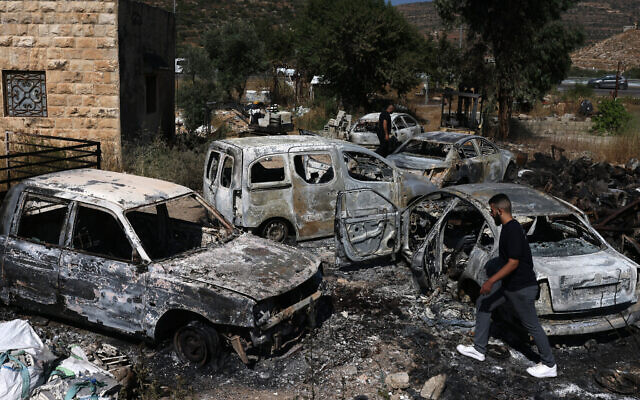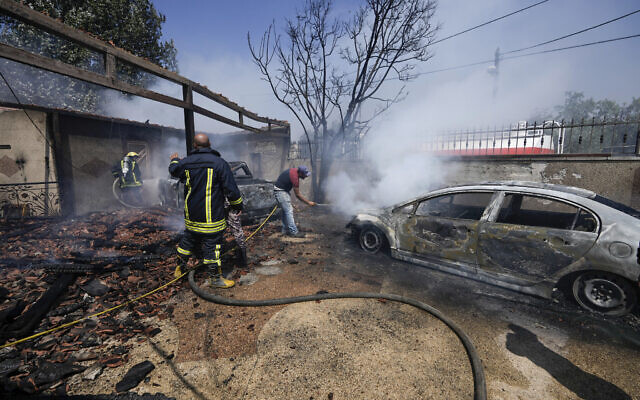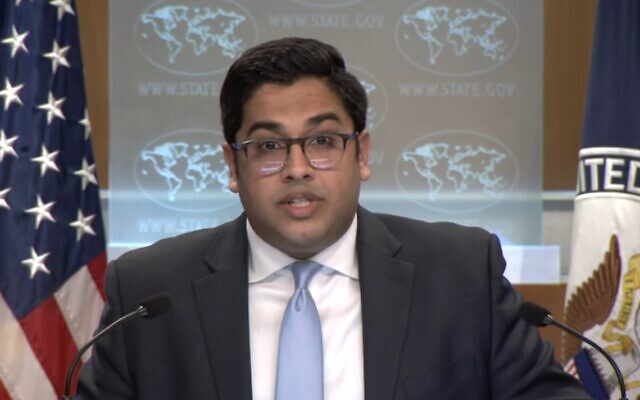US pans settler rampages, says Netanyahu’s settlement announcement ‘incites tensions’
State Department spokesman calls for those behind Israeli reprisal attacks to be held fully accountable, also slams Israeli practice of holding onto bodies of Palestinian attackers
Jacob Magid is The Times of Israel's US bureau chief

The United States on Wednesday condemned reprisal attacks by settlers against Palestinians as well as Prime Minister Benjamin Netanyahu’s plan to build 1,000 new settlement homes in response to a deadly terror shooting that took place in the West Bank on Tuesday.
State Department spokesperson Vedant Patel began his press briefing by issuing a statement on the latest uptick in Israeli-Palestinian violence, condemning the Palestinian shooting attack outside the Eli settlement that left four Israelis dead, before noting the “troubling” reports of subsequent settler violence across the West Bank.
Hundreds of Israeli settlers tore through the Palestinian town of Turmus Ayya on Wednesday afternoon, setting homes, cars and fields on fire and terrorizing residents shortly after Israeli victims of Tuesday’s attack were buried.
The Palestinian Authority health ministry said one Palestinian, Omar Qattin, was killed and another 12 were wounded during the attack by settlers and clashes with Israeli troops. At least four were wounded by gunfire, including one listed in serious condition, the ministry said.
Police said an officer opened fire and hit at least one Palestinian who was suspected of shooting at security forces during clashes. It was unclear if Qattin was the one who was shot by police. It was also unclear who shot the other four Palestinians.
The rioting in the town near Ramallah came after settler vigilantes rampaged in several Palestinian towns in the northern West Bank on Tuesday night, hours after the attack outside Eli.
The rampages appeared to be a grim repeat of an incident in Huwara some termed a “pogrom” earlier this year, after another deadly Palestinian shooting attack.
As Patel held the briefing Wednesday, Palestinian media outlets reported that over 100 settlers from the Yitzhar settlement and surrounding illegal outposts had entered the nearby Palestinian village of Urif and were attacking residents.
“We condemn these violent acts and also extend our condolences to the families of those affected,” Patel said.
“Accountability and justice should be pursued with equal rigor in all cases of extremist violence,” Patel says, using the same talking point employed by the Biden administration after hundreds of settlers ransacked Huwara four months ago, leaving one Palestinian dead and scores injured.
Arrests in that attack were limited and none have been indicted.
No arrests have been made in the past two days of settler attacks either.
The IDF did condemn Wednesday’s attack but did not announce any arrests, instead stressing that the settler violence made it harder for the army to focus on its main mission — protecting Israeli civilians. Netanyahu denounced the rioting in a statement that also addressed unrelated clashes in the Golan Heights between local Druze residents and the police, calling on Israelis to obey the law.
Patel welcomed the IDF statement while adding that the US “expect[s] the Israeli government to ensure full accountability and legal prosecution for those responsible for these attacks in addition to compensation for lost homes and property.”

None of the Palestinians whose homes were damaged in Huwara in February have been compensated by the Israeli government.
The US Office of Palestinian Affairs issued its own statement condemning the “appalling” rampage in Turmus Ayya. “We call for Israeli authorities to immediately stop the violence, protect US and Palestinian civilians and prosecute those responsible.”
Tor Wennesland, the UN’s envoy for Middle East peace, denounced the violence by “Israeli vigilante settlers, against Palestinian residents, land & properties, including a school & an ambulance, in villages around Nablus & Ramallah, following yesterday’s shooting attack.”
“I condemn all acts of terror against civilians,” he tweeted, adding that “Israel, as the Occupying Power, must ensure that the civilian population is protected against all acts of violence, and that perpetrators are held to account.”
Jordan’s foreign ministry also slammed the settler violence, calling on the international community to intervene to provide Palestinians protection.
Egypt’s foreign ministry urged an “immediate cessation” of settler attacks on Palestinian villages in the West Bank, blasting Israeli authorities for failing to intervene in Turmus Ayya and other Palestinian villages where settlers torched dozens of buildings and cars.
“Egypt affirms its complete rejection of acts of intimidation and collective punishment targeting Palestinian citizens,” its foreign ministry said.
Also Wednesday, Patel was asked for comment on the Israeli decision to advance plans for 1,000 new settlement homes in Eli.
The decision was made in a meeting between Netanyahu, Defense Minister Yoav Gallant and Finance Minister Bezalel Smotrich who agreed on the “immediate advancement” of planning for the homes.
“Our response to terror is to hit it hard and build in our land,” the statement said.
It was not clear if the new homes for Eli would be part of the package of over 4,500 homes that the Defense Ministry is set to advance next week.

“Unilateral actions such as this one — such as settlement advancement — will only incite tensions and undermine the prospect of a two-state solution,” Patel said during the briefing.
The settlement announcements already led Morocco to cancel plans to host the second-ever ministerial gathering of the Negev Forum next month, a US official told The Times of Israel Tuesday, adding that they also “taint” efforts to broker a normalization agreement between Israel and Saudi Arabia.
Patel was also asked during the briefing for the US position on the Israeli policy of holding onto the bodies of slain Palestinian attackers.
“Families must be able to bury their loved ones in a dignified and unimpeded manner,” Patel said in response.
Israeli security forces regularly take custody of terrorists’ bodies. Sometimes the bodies are later returned to the assailants’ families for burial. At other times they are withheld — to prevent celebratory funerals in attackers’ hometowns or with a view to using them in negotiations to retrieve the bodies of Israeli soldiers held by terror groups.
Emanuel Fabian contributed to this report.










